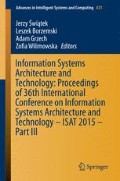Abstract
There is increasing interest in PhD studies, also referred to as 3rd level studies. PhD studies for employees in the IT sector should be mostly focused on strategic fields, advances in software engineering, and software system engineering, however IT architecture should also be an important part of these programs. This evaluation of PhD programs is concerned with their width, depth, quality, and value to the IT industry. It is important to distinguish domain and non-domain characteristics when designing PhD studies. This paper is concerned with establishing a part-time doctoral program in computer science in the context of cooperation with the IT industry. The results of analysis and evaluation of part-time studies are described.
Access this chapter
Tax calculation will be finalised at checkout
Purchases are for personal use only
References
Bologna Declaration. http://en.wikipedia.org/wiki/Bologna_declaration
The Path Forward The Future of Graduate Education in the United States. Council of Graduate Schools and Educational Testing Service, (2010) http://www.fgereport.org/rsc/pdf/CFGE_report.pdf, p. 71
Howell Smith, M.C.: It’s not what you think: A theory for understanding the lack of interest among domestic students in the engineering PhD. In: 41st ASEE/IEEE Frontiers in Education Conference (2011)
Smith, K.A., Streveler, R.A.: Special session—connecting and expanding the emerging engineering education research (EER) and engineering education innovation (EEI) communities. In: 41st ASEE/IEEE Frontiers in Education Conference (2011)
Bonnaud, O., Fremont, H., Thiriet, J.M., Yahoui, H.: PhD in electrical and information engineering in Europe: Towards a harmonization including LifeLong Learning. In: International Conference on Information Technology Based Higher Education and Training (ITHET) (2012)
Bonnaud, O., Fremont, H., Thiriet, J.M.: On the way of harmonization of PhD in Europe in electrical and information engineering: Status and recommendations. In: 23rd EAEEIE Annual Conference, p. 5 (2012)
Valdés, R.A., Moreno, J.C., García, F.J.S.E.: Educating engineering PhD students for a Global World. In: Global Engineering Education Conference (EDUCON) (2012)
Djuricic, A., Grady, H.M., Graham, W.G.: The information economy: Educational opportunities for industry-based professionals. In: IEEE International Professional Communication Conference (2008)
Jamróz, K., Pitulej, D., Werewka, J.: Adapting enterprise architecture at a software development company and the resultant benefits. In: Avgeriou P., Zdun U. (eds.) ECSA 2014, LNCS 8627, pp. 170–185 (2014)
IT Architecture Academy. www.it-architecture.agh.edu.pl
Turek, M., Werewka, J.: Motivation Modeling and Metrics Evaluation of IT Architect Certification Programs, BDAS15, Communications in Computer and Information Science. Springer, London (2015)
Guide to the Software Engineering Body of Knowledge, Version 3.0, SWEBOK®, A Project of the IEEE Computer Society. In: Bourque P., (Dick) R.E. (eds.) Fairley, p. 335 (2014)
Guide to the Systems Engineering Body of Knowledge (SEBoK), v1.3.2. IEEE, pp. 976 (2015)
Bass, L., Clements, P., Kazman, R.: Software Architecture in Practice (3rd edn) (SEI Series in Software Engineering) (2012)
Acquiring skills through the Advanced-Level scheme, iSAQB (International Software Architecture Qualification Board), http://www.isaqb.org/certifications/advanced-level
Koczkodaj, W., Kułakowski, K., Ligęza, A.: On the quality evaluation of scientific entities in Poland supported by consistency-driven pairwise comparisons method. Scientometrics (2014)
Agresti, W.W.: Advancing the IT Research Agenda, RIIT’13, pp. 11–16 (2013)
Yasinsac, A.: Cynthia Irvine. Help! Is there a trustworthy-systems doctor in the house? IEEE Secur. Priv. 73–77 (2013)
Author information
Authors and Affiliations
Corresponding author
Editor information
Editors and Affiliations
Rights and permissions
Copyright information
© 2016 Springer International Publishing Switzerland
About this paper
Cite this paper
Werewka, J., Turek, M. (2016). Computer Science PhD Program Evaluation Proposal Based on Domain and Non-domain Characteristics. In: Świątek, J., Borzemski, L., Grzech, A., Wilimowska, Z. (eds) Information Systems Architecture and Technology: Proceedings of 36th International Conference on Information Systems Architecture and Technology – ISAT 2015 – Part III. Advances in Intelligent Systems and Computing, vol 431. Springer, Cham. https://doi.org/10.1007/978-3-319-28564-1_15
Download citation
DOI: https://doi.org/10.1007/978-3-319-28564-1_15
Published:
Publisher Name: Springer, Cham
Print ISBN: 978-3-319-28562-7
Online ISBN: 978-3-319-28564-1
eBook Packages: EngineeringEngineering (R0)

